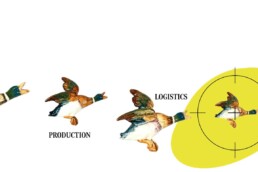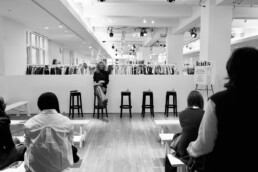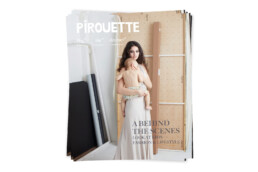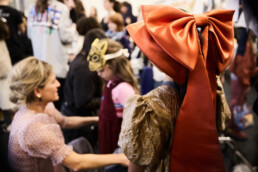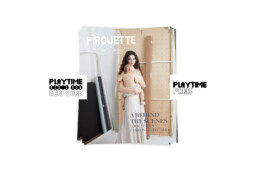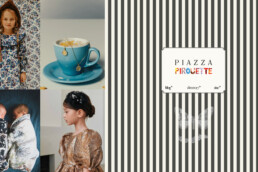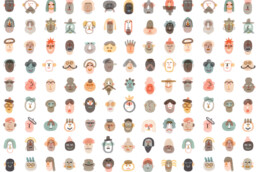Portugal has a great manufacturing tradition: textile, shoes, furniture, ceramics. From small independents to luxury brands, most of the fashion labels produce their clothes and shoes around the city of Porto: Paul Smith, Isabel Marant, Stella McCartney, Ralph Lauren, Burberry, Maison Kitsune, Tommy Hilfigher, all use production facilities in the area, to name only a very few.
A fair number of Childrenswear brands also share the “Made in Portugal” label. Here is a little overview of what you can expect from Portugal, where and how to find manufacturers.
What are Portugal’s most attractive points?
Quality: Portuguese people are very qualified.
Reactivity: It is easy to get a production done with short lead times, and to have reorders.
Proximity and Accessibility: Portugal is approximately 2 hours’ flight from Paris or London. It is in the same time zone as the UK, 1h behind France. There are frequent flights run by both established airlines and low-cost carriers. It is also typically cheaper and faster to ship merchandise from Portugal to Continental Europe.
Flexibility: It is possible to produce small quantities.
Creativity: Brands appreciate the fact that when they are stuck with a missing fabric or accessory, the factory always finds an suitable and creative solution.
What do brands say about their experience in Portugal?
Siv Tone Kverneland of Finger in the nose considers herself totally satisfied with her Portuguese suppliers. “We produce all our cut and saw knits and also most of our heavy knits. My first production experience in Portugal was with my previous company and that started in 1999. For Finger in the nose we started production in Portugal in 2008 – The brand started in 2004 – we had some (let’s say less great) experiences with India and Turkey before going to Portugal.”
Based in the UK, Miller produces everything in Portugal, apart from their knitwear. After five years of Portuguese production, Nickey Thrussell founder of the brand has learned how to handle things. “Obviously it has taken lots and lots of work to get everything in place and to the quality we want it to be, but we work with great manufacturers who are very tolerant of our quantities and requirements. Occasionally you get a bad season with one factory, but then we tend to try and source a new one to replace them as quickly as possible. All our suppliers from fabric to factories are all really, really nice and have always been great when our quantities were very small”.
When Violaine Belle-Croix launched her shoe label Clotaire two years ago, she opted for Portugal and she reognizes it was a good choice. “It is so complicated for the ‘Made in France’ that Portugal has become like the promised land when it comes to shoes. The quality is much higher than in Spain”.
Dandy Star produces their jersey in Portugal, though an agent. “I love going to Oporto for factory visits and spending time in the city walking the streets and getting inspired by the architecture” says Charlotte Day. “Portugal has become very expensive but the quality is good, I can only give them a 8/10”.
“Perfect price/quality mark” comments Merel of Dutch brand Kidscase, very enthusiastically. “Once the consumer notices the great quality of these products together with our funky designs of course, they want to have them over and over again. I think our supplier understands our taste for colours and graphic design very well, and also understands the Kids Case image we want to create. So when they receive our design drawings they perfectly translate them into kidscase pieces. We hardly ever need to make adjustments in the samples, for example. And from a logistics and client service perspective, our supplier always delivers samples and production on time, and always in complete quantities”.
For Swiss brand Lasticot, the quality is exceptional. “Thanks to our good relations especially with our main supplier, we can react very quickly if something needs to be changed/ adjusted during the production process, or if production mistakes happen, we can also quickly send back the merchandise and have it adjusted/ changed in a matter of 1-2 weeks. Reorders during the season are also possible and can be met within 2-3 weeks if we have sufficient materials left over”.
“We love the accessibility, that they keep to the same office hours as us, the ease of delivery of European fabrics, workable minimums and a good standard generally”, says No Added Sugar, who started their production in Portugal in 2002. “I would award 9-10 for quality but 5 for price. It is expensive and to achieve good margins can be difficult,” continues Deborah Medhurst.
“We chose Portugal for our production because we feel European,” says Marie Soudre Richard of Little Fashion Gallery – “especially when we launched we were looking for reactivity and people we can liaise with smoothly. We had delays in deliveries and production was OK. The strength of Portuguese factories relies in great fits – they understand and follow our technical drawings”.
Portugal is back
At the end of the 90’s, many brands moved their production to Asia to increase their margins. Hong Kong, China, India became the center of textile production for everyone, including designers and luxury brands. Today, Portugal sees many of them returning.
“Portugal has once again become a key player in the sourcing strategies of most of the main European brands. Despite the booming of the Far East industries and the consequent move of the major customers in the last 2 decades, brands are now considering relevant factors such as the proximity and the textile industry heritage amongst others. After some years of poor performance Portugal is now ready to take this new challenge with much more resources as well as motivation”. Says Mafalda Mota Pinto, CEO of Scoop, a production agency.
Interesting also to hear the comments of Sonia and Claudia Rocha, founders of the brand Wolf and Rita. The two sisters are on both sides of the industry, as brand owners, but also involved in production, as they own a shirt factory in Guimaraes with their father. “As a manufacturer and as Portuguese citizens, we would like to see brands coming to produce here because of the quality of our products and services rather than because we represent cheap European labor. Our prices have to be competitive, but there is much more beyond this in Portugal. We are easy people to work with, straightforward and importantly, trustworthy and honest. I would like to see brands appreciating and respecting our history of artisans and extremely well qualified workers in the textile industry. People should also take into consideration that the competitive Asian prices come from very low salaries, unfortunately. In our opinion the quality of the products and manufacture in Portugal is our greatest advantage. Because there are no customs and taxes involved to ship to Europe the turnaround time can be very good also”.
Where are the factories and how to find a suitable producer in Portugal?
The factories are concentrated in the North of the country, around Porto. Vizela and further up North for woven fabrics, Guimarães, Barcelos and Famalicão for jersey and knitwear, Covilhã and Guarda for wool products, Felgueiras and São João de Madeira for shoes. Smaller artisans are spread all over the country.
For small brands, the main resource for finding producers is still word of mouth: fabric reps, manufacturers in other countries, colleagues, etc. Specialized trade fairs are also a good source. Lasticot found their factory partners at the trades show Zoom by Fatex. In Portugal, the Textile and clothing association ATP sends representatives to all major fairs around the world to promote their industry.
French brand Chupeta has been working directly with Portuguese factories since 2002. Fatima de Araujo, owner of the brand, made contact with factories while doing an internship in Portugal. So for her it was no trouble to source production.
Another interesting approach is to visit and explore. I recently came across two examples of brand owners who booked a ticket to Portugal to have a look around. They both succeeded in finding what they were looking for.
To find a suitable atelier for her small production of beautiful fabric necklaces and jewelry pieces, Mathilde de Turckheim didn’t hesitate to fly from Paris. She visited the fabric stores in the center of Porto, asked questions around and found her way to a small unit that is now working on her next collection. “Visiting is crucial. It takes a bit of time, it can be strenuous work but you always end up finding the right supplier. I wish I had more time to look around Viana di Castello, the cradle of embroidery. Next time!”.
On her side, Emily McMaster of Mabo Kids flew all the way from Utah last fall to look for a shoe factory. “Up to that point, we had been making them all by hand. Serena, our shoe designer and maker, had heard that Portugal was a great place to produce shoes because it was a great blend of artisan quality, great technology, and yet would probably be less expensive than Italy. We had a couple of contacts, but basically landed in Portugal with a pair of our shoes in a little bag, prepared to knock on the doors of factories, see where and how the shoes were being made, and get some quotes and samples under way.”
“While there, we visited a shoe last factory, a shoe-making trade school, several leather tanneries and shoe factories. The school was amazing with an emphasis on shoemaking as a valued artisanal trade. The shoe last factory was also really impressive – we watched the entire process of making thousands of lasts with state-of-the-art technology at a fraction of what we had paid for our run of lasts from the UK. We were also really pleased with leather tanneries, their decent minimums and color choices for a small company. We found a factory, we had a sample made, got a quote, and are hung up at the moment on making sure that the leather we source there meets and has the paperwork for the US child safety laws, as well as figuring the import costs/ taxes into the quotes. To be honest, this has been a much harder part of the process than working with the factory on the details of the shoes, cost of production, and sample-making, all of which were quite simple through email. I have to say through our visit we were really impressed with the emphasis clearly put on production and quality in Portugal – the technology was amazing, the people seemed passionate about and happy with their jobs, the products that we saw coming out of the factories were great”.
Launched two years ago, Pois Selection offers a handpicked selection of the best Portuguese products – only things that the owners, two stylish French women based in Lisbon, love and buy themselves. Caroline Filou and Anne-Marie Bonnamy travel the country to identify authentic, original and contemporary products, made by brands and artists, some already very well established and some still very unknown and very small. Eau de toilette, soaps, candles, notebooks, home textile with handmade embroidery are part of their selection. They experimented with working directly with some local seamstresses in Lisbon to avoid intermediaries and manage the design and production on their own. “We were positively surprised by their responsiveness, their openness and willingness to get the orders and be pro-active on the design. The labour cost is cheap; the only issue remains the production capacity not able to cope with big orders”.
Newly installed in Porto from Spain, Agnes Boudahana has just stated her own agency. A seamstress trained in Paris, Agnes knows a lot about sewing and following productions. For her starting phase she has decided to help designers find ateliers, workshops, small factories adapted to small run production, or even women who can embroider, knit and sew very small quantities of high quality products.
Working in Portugal: with an agent or directly?
A large number of the brands I spoke to work with an agent. Others work directly with the factories, and some also have a mix of the two, like Little Fashion Gallery and Finger in the Nose, who had this to say: “For the most part (about 95% of the volume), we work with an agent – for the rest (heavy knits), we work directly with a factory”. The same holds true for Miller: “We work with a great agent but also directly with the factories and we also have an amazing man who we buy fabric from who has helped us so much with sourcing the right manufactures for us”. No Added Sugar works directly with producers, although they worked with agents too in the past. “We like to deal direct where possible for more efficient processes and to build relationships”.
Visiting Portugal : the cherry on the cake
So, apart from a complaint concerning the respect of delivery deadlines, Portugal seems to be a good place for production. It also offers another pleasant fringe benefit: combining work with pleasure.
“We absolutely loved visiting this gorgeous country. Yearly visits to Porto would be reason enough to produce there!” says Emily McMaster (Mabo Kids).
“The boozy business lunch is alive and kicking in Portugal! Plus our drinks cupboard is jammed packed with some pretty good port…!” continues Deborah Medhurst (No Added Sugar).
“I love going to Oporto for factory visits and spending time in the city walking the streets and getting inspired by the architecture” comments Charlotte Day (Dandy Star).
“Porto is beautiful, sadly when we go its all been a bit to much work and not enough fun!” regrets Nickey Thrussell (Miller).
“I love Portugal and Portuguese people and would love to have more time to visit each time I go for work :)”, adds Siv Tone Kverneland (Finger in the nose).
A good number of brands are relocating their production to Portugal, as highlighted in an article from Monocle Magazine (April 14 issue). In echoing some of Monocle’s findings, Marie Soudre Richard of Little Fashion Gallery sums it up well: “We would love to work more with Portugal and encourage business in Europe”.
Useful Contacts
Mefri – Sonia Rocha +351936010990 // sonia.mefri@gmail.com
ATP Telefone: (+ 351) 252 30 30 30 Fax: (+ 351) 252 30 30 39 E- mail: atp@atp.pt www.atp.pt
Scoop – Mafalda Pinto. www.scoop.pt. info@scoop.pt, +351 252 308 350.
Agnes Boudahana – agnesbouhadana@hotmail.com – +351 915 289 280
Appicaps (Portuguese Association for the Shoe Industry) – apiccaps.pt
Pois selection www.poisselection.com
Florence Rolando
Florence Rolando (journalist, co-founder of Bubble Trade Shows) was the original Founder of Pirouette in early 2009. Pirouette blog* has been a reference in the industry since it started with its combined business and consumer view of the children’s market. A fantastic resource for children’s fashion, design, trends and culture, it aims to support creativity and talent but it also does this by talking about life, family, culture and health.
Florence is an international leader in the industry (8 years as a Milk Collaborator, contributor to Naif Magazine in Spain, co-founder of Bubble Trade Shows in New York and London).
Now Florence runs Energy Therapy Porto @enrgy_therapy_porto
Subscribe to our Pirouette Newsletter
For news, updates and insights into the business of kids fashion & lifestyle
You might also like
March 2, 2026
The Power of Collaboration – Thinking Beyond Product
Original article Pirouette MagaZine* FW26 Selling Season. Collaboration has become a buzzword in fashion, but too often it is understood in a narrow, product-led way. In today’s market,…
February 28, 2026
Collaboration in Kids Fashion & Lifestyle
Opinion: Collaborations Interview questions by Jenn Cattaui, Babesta founder/owner Answers by Katie Kendrick – Pirouette media -blog* magaZine* directory* agency* consultancy* I was one of…
February 14, 2026
EDITORS LETTER: Getting your ducks in a row!
Pirouette MagaZine* article: Original article Pirouette MagaZine* FW26 Selling Season. Pirouette Maga(zine), because you’re worth it. 2026 is the year to get your ducks in a row in the kids’…
January 30, 2026
The Runway
Pirouette’s The Winter Moth Runway, FW26 The Winter Moth tells the tale of a dreaming girl who, once asleep, transforms into a winter moth. She drifts into a magical forest, accompanied by her clumsy…
January 30, 2026
Backstage at the Winter Moth runway
PITTI BIMBO 102 >>> 25-26 June 2025, Fortezza da Basso, Florence Behind the scenes at the Pirouette FW26 runway show Behind every runway show is an army of models, dressers, hair &…
January 29, 2026
The Winter Moth Runway LOOKS
PITTI BIMBO 102 >>> 25-26 June 2025, Fortezza da Basso, FlorenceAs captured by Molly Magnuson.Molly's photography captures the beauty of childhood through a lens that feels both fresh and…
January 24, 2026
New year, new look MagaZine!
Pick up a Pirouette directory at Playtime Paris Playtime Paris, January 24-26, 2026, Parc Floral 2026 is the year to get your ducks in a row in kids’ fashion and lifestyle. While there are many…
January 15, 2026
Piazza Pirouette FW26 – A Winters Tale!
PITTI BIMBO 102 >>> 25-26 June 2025, Fortezza da Basso, FlorencePiazza Pirouette is your 'must-visit' destination at Pitti Bimbo 102 to discover kids’ fashion and lifestyle newness for……
October 19, 2025
Pirouette collective⁺
Bold brands exploring new markets in kids' fashion & lifestyle. What is the Pirouette collective⁺ ? Pirouette collective⁺ is an initiative by Pirouette designed to support forward-thinking…


